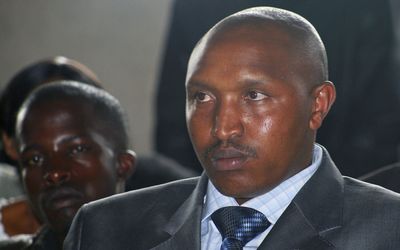Congolese warlord denies guilt at ICC despite turning himself in
by Thomas Escritt,
2013-03-27 05:45:47.0
THE HAGUE — Bosco Ntaganda, a Congolese warlord who evaded arrest on war crimes charges for seven years, denied guilt when he appeared for the first time at the International Criminal Court (ICC) on Tuesday.
Col Ntaganda unexpectedly gave himself up to diplomats at the US embassy in Rwanda last week, walking in off the street and demanding to be handed over to the ICC. Within days he was sent to The Hague.
He is accused of murder, rape and other crimes over a 15-year-period of fighting in Rwandan-backed rebellions in eastern Democratic Republic of Congo. His appearance almost seven years after the court first issued a warrant of arrest is a success for the ICC after the collapse of several cases.
A stooped and bowed Col Ntaganda appeared ill at ease in court on Tuesday, leaning forward and looking down as the hearing began. He confirmed his name, gave his age as 39, and told the court he was not guilty of the charges, but a judge interrupted and said this was not the occasion for discussing his guilt.
Asked whether he was aware of the charges against him, Col Ntaganda said: "I was informed of these crimes, but I plead not guilty."
Bulgarian judge Ekaterina Trendafilova, who was presiding alone over the hearing, stopped him. "I wouldn’t like to interrupt you, because you should feel at ease," she said. "But the purpose of this initial hearing is … to know whether you have been informed about the crimes … your rights, and we are not discussing now anything related to your guilt or innocence."
Speaking through interpreters in Kinyarwanda, he said: "I was born in Rwanda but I grew up in Congo. I am a Congolese citizen. I was a soldier in the Congo."
Col Ntaganda is accused of recruiting child soldiers, murder, ethnic persecution, sexual slavery and rape during a 2002-03 conflict in northeastern Congo’s mineral-rich Ituri district.
Most recently, he was a commander in the M23 rebel movement, but his whereabouts had been unknown after he had fled to Rwanda with hundreds of his followers, and his decision to turn himself in to the US embassy in the capital Kigali caught diplomats there by surprise.
Analysts said he may have felt that his life would be safer in an ICC detention cell than in an increasingly hostile Rwanda.
A date of September 23 was set for the next hearing at which judges will decide whether the evidence against Col Ntaganda is strong enough to warrant a trial — by no means a foregone conclusion.
Recently, prosecutors withdrew their case against Kenyan civil servant Francis Muthaura after a witness retracted his testimony, prompting lawyers to drop charges against his co-accused Uhuru Kenyatta, Kenya’s president-elect.
With many of the court’s suspects, including Ugandan warlord Joseph Kony and Sudanese President Omar al-Bashir, at large and beyond its reach, Col Ntaganda’s arrival is especially welcome to prosecutors and activists.
"Ntaganda’s detention in The Hague shows that no one is above the law," said Geraldine Mattioli-Zeltner of Human Rights Watch.
Reuters

Congolese war-crimes suspect Gen Bosco Ntaganda in Goma in 2009. Picture: REUTERS
THE HAGUE — Bosco Ntaganda, a Congolese warlord who evaded arrest on war crimes charges for seven years, denied guilt when he appeared for the first time at the International Criminal Court (ICC) on Tuesday.
Col Ntaganda unexpectedly gave himself up to diplomats at the US embassy in Rwanda last week, walking in off the street and demanding to be handed over to the ICC. Within days he was sent to The Hague.
He is accused of murder, rape and other crimes over a 15-year-period of fighting in Rwandan-backed rebellions in eastern Democratic Republic of Congo. His appearance almost seven years after the court first issued a warrant of arrest is a success for the ICC after the collapse of several cases.
A stooped and bowed Col Ntaganda appeared ill at ease in court on Tuesday, leaning forward and looking down as the hearing began. He confirmed his name, gave his age as 39, and told the court he was not guilty of the charges, but a judge interrupted and said this was not the occasion for discussing his guilt.
Asked whether he was aware of the charges against him, Col Ntaganda said: "I was informed of these crimes, but I plead not guilty."
Bulgarian judge Ekaterina Trendafilova, who was presiding alone over the hearing, stopped him. "I wouldn’t like to interrupt you, because you should feel at ease," she said. "But the purpose of this initial hearing is … to know whether you have been informed about the crimes … your rights, and we are not discussing now anything related to your guilt or innocence."
Speaking through interpreters in Kinyarwanda, he said: "I was born in Rwanda but I grew up in Congo. I am a Congolese citizen. I was a soldier in the Congo."
Col Ntaganda is accused of recruiting child soldiers, murder, ethnic persecution, sexual slavery and rape during a 2002-03 conflict in northeastern Congo’s mineral-rich Ituri district.
Most recently, he was a commander in the M23 rebel movement, but his whereabouts had been unknown after he had fled to Rwanda with hundreds of his followers, and his decision to turn himself in to the US embassy in the capital Kigali caught diplomats there by surprise.
Analysts said he may have felt that his life would be safer in an ICC detention cell than in an increasingly hostile Rwanda.
A date of September 23 was set for the next hearing at which judges will decide whether the evidence against Col Ntaganda is strong enough to warrant a trial — by no means a foregone conclusion.
Recently, prosecutors withdrew their case against Kenyan civil servant Francis Muthaura after a witness retracted his testimony, prompting lawyers to drop charges against his co-accused Uhuru Kenyatta, Kenya’s president-elect.
With many of the court’s suspects, including Ugandan warlord Joseph Kony and Sudanese President Omar al-Bashir, at large and beyond its reach, Col Ntaganda’s arrival is especially welcome to prosecutors and activists.
"Ntaganda’s detention in The Hague shows that no one is above the law," said Geraldine Mattioli-Zeltner of Human Rights Watch.
Reuters




















